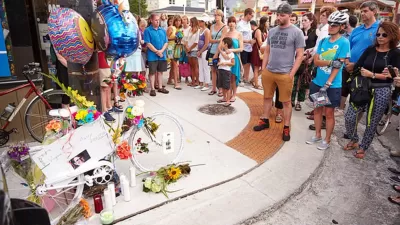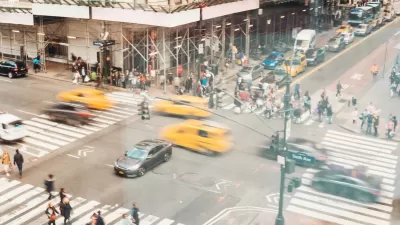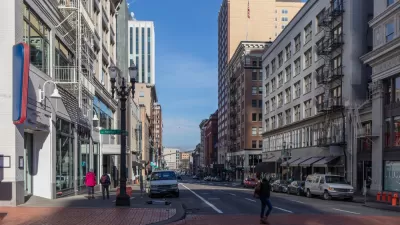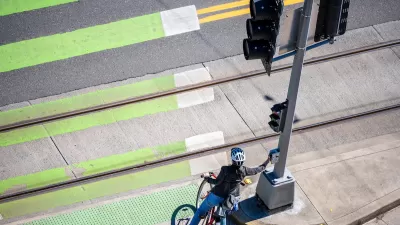To end traffic fatalities while still enabling urban mobility, cars will have to slow down and people will have to travel by other modes.

Antonio Loro writes an opinion piece on the subject of traffic safety and the inevitable backlash against efforts to achieve "Vision Zero" safety improvements.
It seems that some members of the public are more concerned that Vision Zero projects (like reducing vehicles lanes, adding traffic calming elements to the street, and improving bike infrastructure) will kill something more sacred than human life—the ability to quickly move from point a to point b in a car. Loro cites recent controversies over road diets on the Westside of Los Angeles as evidence of the willingness of some communities to sacrifice lives for the sake of mobility.
Loro's argument is just the opposite: that urban mobility must not sacrifice human lives. "To end road deaths, cities will have to tame unruly traffic, though it won’t be necessary to slow everything to a crawl; beyond that, more people will have to shift to modes of transport that, conveniently, are both safer than cars and provide more efficient ways to get around cities."
Loro details the kinds of measure that can slow down traffic, while pointing to the example of airline safety as an example of the kind of safety considerations that can be implemented for travel. Still, despite the many options for reconfiguring the street available to Vision Zero campaigns, people will still have to decide to travel by more efficient modes, like biking, walking, or riding public transit, if they want to improve traffic safety and improve congestion in the city.
FULL STORY: What’s the right number of people to kill on the roads? (Hint: it’s zero)

Planetizen Federal Action Tracker
A weekly monitor of how Trump’s orders and actions are impacting planners and planning in America.

Map: Where Senate Republicans Want to Sell Your Public Lands
For public land advocates, the Senate Republicans’ proposal to sell millions of acres of public land in the West is “the biggest fight of their careers.”

Restaurant Patios Were a Pandemic Win — Why Were They so Hard to Keep?
Social distancing requirements and changes in travel patterns prompted cities to pilot new uses for street and sidewalk space. Then it got complicated.

Platform Pilsner: Vancouver Transit Agency Releases... a Beer?
TransLink will receive a portion of every sale of the four-pack.

Toronto Weighs Cheaper Transit, Parking Hikes for Major Events
Special event rates would take effect during large festivals, sports games and concerts to ‘discourage driving, manage congestion and free up space for transit.”

Berlin to Consider Car-Free Zone Larger Than Manhattan
The area bound by the 22-mile Ringbahn would still allow 12 uses of a private automobile per year per person, and several other exemptions.
Urban Design for Planners 1: Software Tools
This six-course series explores essential urban design concepts using open source software and equips planners with the tools they need to participate fully in the urban design process.
Planning for Universal Design
Learn the tools for implementing Universal Design in planning regulations.
Heyer Gruel & Associates PA
JM Goldson LLC
Custer County Colorado
City of Camden Redevelopment Agency
City of Astoria
Transportation Research & Education Center (TREC) at Portland State University
Camden Redevelopment Agency
City of Claremont
Municipality of Princeton (NJ)





























